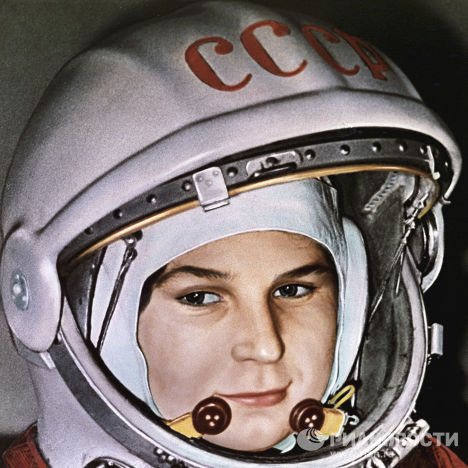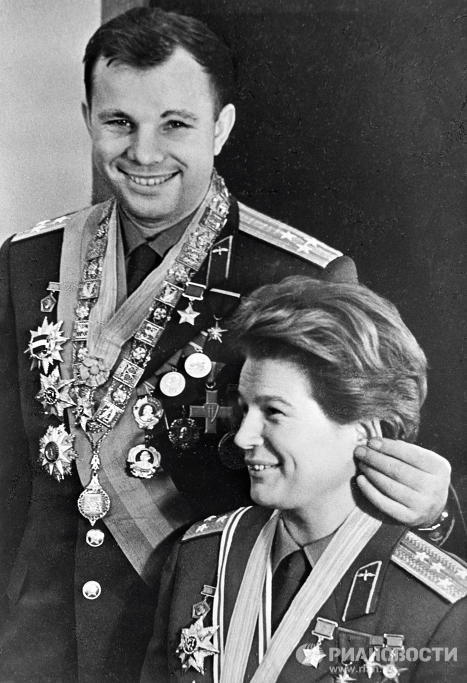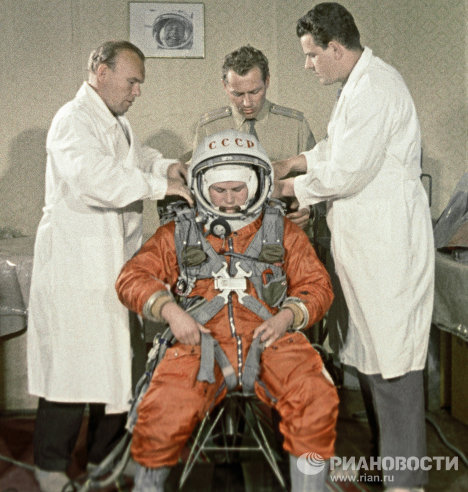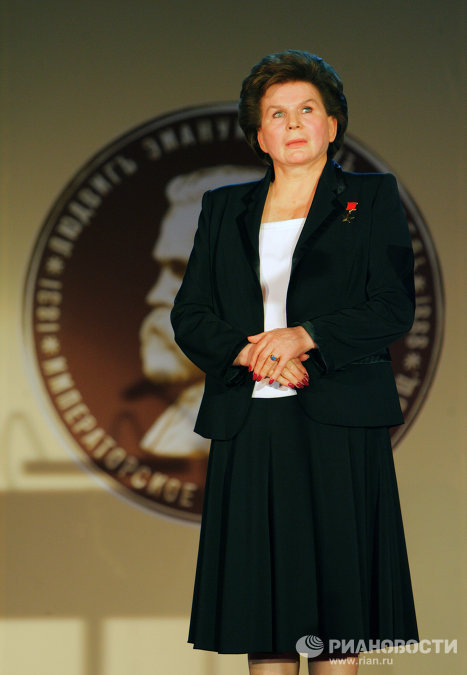Now and Then: 20 Years After the Soviet Collapse | EurasiaNet.org.
Category: Soviet
The US-Russia Space Race: An exercise in Cold War brinkmanship (More Key Events)
The US-Russia Space Race: An exercise in Cold War brinkmanship
October 4, 1957: The Soviet Union launches the world’s first satellite, Sputnik 1, stunning the United States November 3, 1957: The Soviet Union puts the first animal in space, a dog called Laika who orbits the Earth but dies in the process.
January 1, 1958: America successfully launches its first Earth satellite.
October 1, 1958: America sets up the National Aeronautics and Space Administration or NASA.
September 12, 1959: The Soviet Union launches the first spacecraft, Luna 2, to reach the surface of the Moon.
August 19, 1960: The Soviet Union launches a spacecraft carrying two dogs, Belka and Strelka. The two dogs survive the mission and return to Earth, paving the way for the first manned space flight.
April 12, 1961: Yuri Gagarin becomes the first human to journey into outer space orbiting the Earth once in a flight that lasted 108 minutes.
May 5, 1961: America’s Alan Shepard completes a suborbital journey into space.
February 20, 1962: America’s John Glenn orbits the Earth three times.
June 16, 1963: Cosmonaut Valentina Tereshkova becomes the first woman to travel into space.
January 27, 1967: America’s Apollo 1 Moon mission ends in tragedy as it catches fire during a launch test killing three crew members.
July 16, 1969: America’s historic Apollo 11 mission lands on the Moon.
July 20, 1969: America’s Neil Armstrong becomes the first human to walk on the Moon.
November 17, 1970: The Soviet Union lands a remote-controlled robot on the Moon in another world first. America does the same the following year.
April 19,1971: The Soviet Union launches the first space station, Salyut 1.
April 12, 1981: America launches its first Space Shuttle in orbit.
1986: The Soviet Union launches what will become the first permanently-manned space station. Mir. It is permanently manned from 1989-1999 but decommissioned in 2001 by Russia which is struggling to fund what is left of the Soviet space programme.
Key events in the history of space exploration
Key events in the history of space exploration
4 October 1957: The Soviet Union launches Sputnik 1, the first Earth-orbiting artificial satellite, igniting the space race. Sputnik’s radio signals continue for 22 days until the transmitter batteries run out. It burns up on 4 January 1958 as it re-enters the Earth’s atmosphere
3 November 1957: The dog Laika, the first living creature ever to orbit the earth, is launched aboard Sputnik II. Laika dies a few hours after launch, although this is kept secret until 2002. Instead, the Soviets claim she lived for several days
Read on for 30 more key events.
(Via The Telegraph)
Divorce in haste, repent at leisure
Divorce in haste, repent at leisure
Twenty years today the USSR held a referendum on whether to support the proposed New Union Treaty. The new setup would have given much more power to the republics; the word used to describe it then was “confederation”.
This infographic displays data on how people voted during this referendum (click for full size)
(This graphic could be misleading, as it takes numbers not from the whole population of potential voters but from those who actually did vote; in several areas not voting was voting “no”). The three Baltic SSRs, the Moldavian, Georgian and Armenian SSRs did not hold votes, on the grounds that they had not legally been incorporated into the USSR in the first place. But the Abkhaz ASSR voted by a small margin to stay in. The Chechen-Ingush ASSR voted to get out as did the Nakhichevan ASSR
Three quotations are instructive: “The recent dramatic events [ie the coup attempt] showed that our republic is absolutely unprotected… ” (Kravchuk 1991); “if Ukraine really will not be in the Union, I cannot imagine such a Union” (Yeltsin 1991); “I believed that Ukraine is so rich that it provided for the entire [Soviet] Union” (Kuchma 1993).
Divorce in haste, repent at leisure: a recent poll from Ukraine says half the population now regrets the breakup. (See article More than half of Ukrainians regret Soviet breakup [Ria Novosti])
(Via Business Special Report [BSR] Russia)
“Cinderella of the Stars” Valentina Tereshkova – First woman in Space
“Cinderella of the Stars” Valentina Tereshkova – First woman in Space
In June 1963, the whole world heard about the Russian “Chaika” (Seagull), Valentina Tereshkova’s call sign.
The first woman in space, ”Cinderella of the Stars” was born into a peasant family and worked at a textile factory after finishing evening school.
While working and earning an education at a technical school by correspondence, Valentina dreamed of the heavens. She learned how to skydive at a local aero-club, completing 163 jumps.
“There were only five women in our group, but the workload was more than the men’s,” Tereshkova explains, saying the training was extremely rough at that time. “But each of us was obsessed with the crazy idea of completing the training with brilliant results and of making a spaceflight.”




In 2000, Valentina Tereshkova was named “Greatest Woman Achiever of the Century” by the British Women of the Year Association.
(Via Ria Novosti)
Flying into history in 108 minutes
Flying into history in 108 minutes
Fifty years ago on April 12, with a stirring cry of “Let’s Go!” (Poekhali), cosmonaut Yuri Gagarin raced on a Soviet rocket to become the first human to go into outer space. Launching in the Vostok spacecraft from Kazakhstan at 9.06 a.m. that radiant sunny day in 1961, the 27-year-old son of a carpenter circled the Earth once on a 108-minute space flight before parachuting safely to the ground in the Saratovregion of the U.S.S.R.
This short but epic foray into outer space inspired millions of people around the globe, and ignited a Cold War race between the superpowers for technological superiority.
Space exploration has, however, become increasingly cooperative since the end of the Cold War, especially with the ongoing assembly of the 18-country International Space Station (ISS). Amid the unfolding competition, one thing has not changed: on April 12, Russians everywhere honour the space odyssey legacy embodied by Gagarin. “Space will always remain a priority of ours. Russia is a world leader in the commercial satellite launch market, which helps to propel its space industry.
(Via Russia and India Today)
The first and only national referendum in Soviet history
The first and only national referendum in Soviet history
Twenty years ago, on March 17, 1991, the first and only national referendum in Soviet history was held. Citizens of the Soviet republics were offered the opportunity to express themselves on the matter of the preservation of the union state in “an updated form.” And although six of the union republics refused to participate, the majority of the remaining population voted in favor of the preservation of the Soviet Union. Nevertheless, only a few months later, the Soviet Union ceased to exist.
Today, Rossiyskaya Gazeta experts (Gleb Pavlovsky [president of the Effective Politics Foundation], Valery Khomyakov [general director of the National Strategy Council], Dmitry Orlov [general director of the Agency for Political and Economic Communications], Boris Makarenko [first deputy general director of the Center for Political Technologies]) share their assessments of the event.
The referendum did not fail; it was the Soviet Union that failed. Of course, ultimately referendum results were annulled when Mikhail Gorbachev stepped down as president of the Soviet Union. It is also important that the referendum was the last collective expression of the peoples of the Soviet Union, which could have been something to rely on in certain actions. But the actions of the Soviet leadership were destructive.”
Many party members were categorically against this wording – they did not oppose preservation of the Soviet Union, but were against socialist values.
Most people voted ‘yes’ in the referendum. The same people who said ‘yes’ to ‘preserving the Soviet Union based on socialist values’ had forgotten everything and voted for independence.
The situation that happened with the referendum reaffirms the double-sided position of the Soviet leadership. If the Soviet leadership had conducted the referendum more precisely and acted more decisively in accordance with its results, without allowing for a collapse of the Soviet budget, for example, or unconstitutional actions by the Soviet republics, then it could have been a completely different situation. I agree with Vladimir Putin’s assessment that the collapse of the Soviet Union was a major geopolitical catastrophe of the 20th century. Six of the 15 republics boycotted the referendum and unequivocally opposed the union. The referendum was not perfect, because the very wording – ‘Are you for or against the updated Soviet Union?’ – was unclear. A result of the referendum was a new union agreement, into which several union republics tried to enter in August.
(Via The Russia and India Report)
